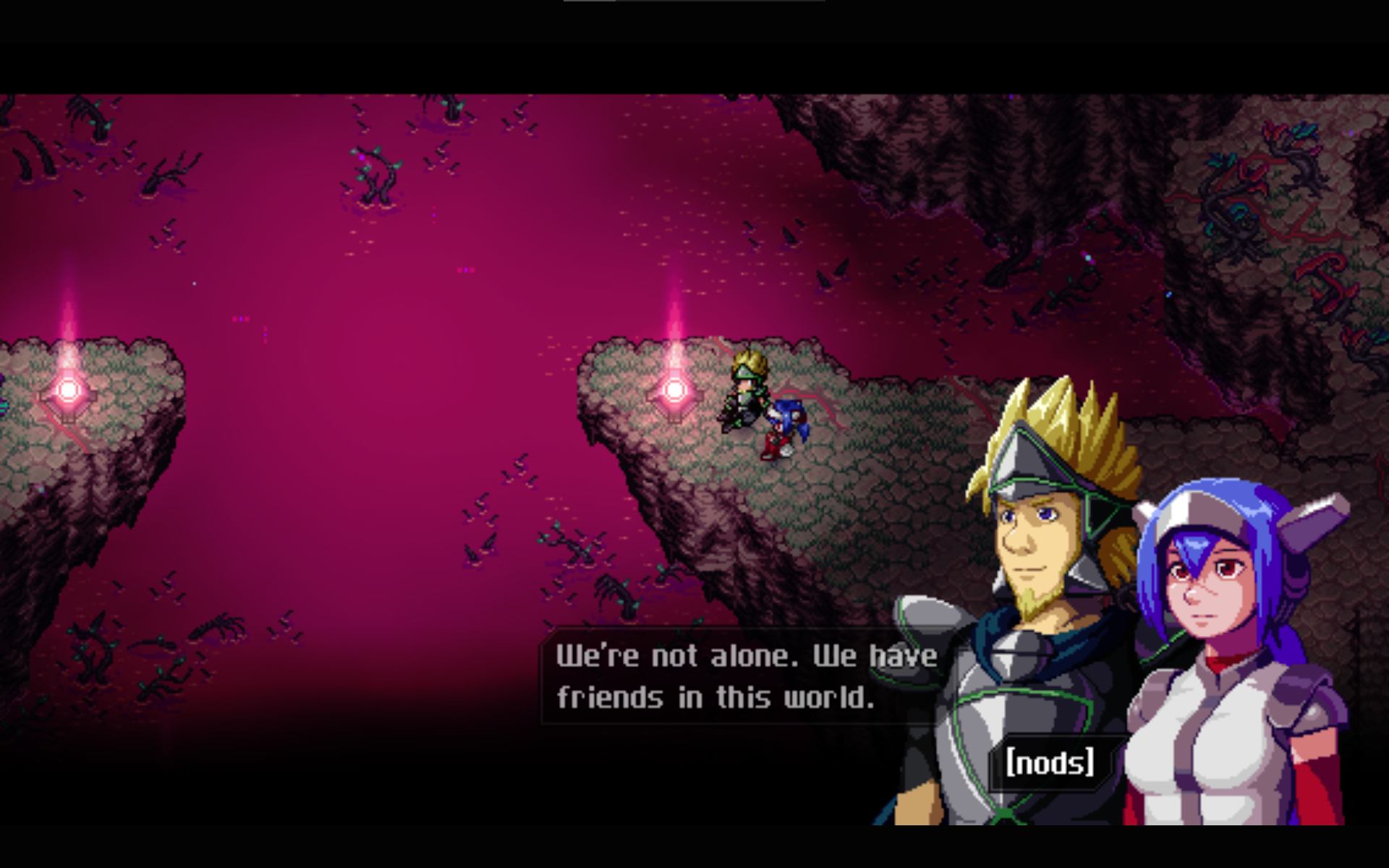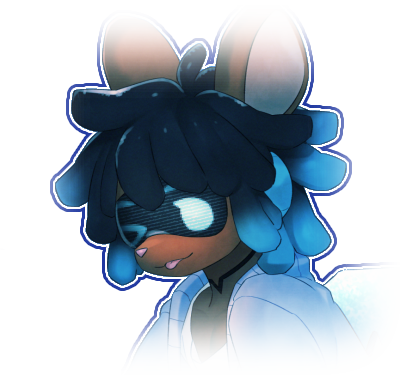CrossCode and individuality and other crap
March 12, 2024

A little while back I finished reading Altered Carbon, which had some big transhumanist themes and went a little into what it means to be "you".
I also finished CrossCode some time ago! I could talk about the excellent combat and world design, great QOL features and secrets, well-designed dungeons and puzzles, etc, but I think i'd rather chew on the overlap between the book I read and this game I played, and how it kinda completely winded me. SPOILERS FOR CROSSCODE AND THE BEGINNING OF THE A NEW HOME DLC!!!
CrossCode's narrative has very sparse pacing by design; it takes a "pivotal events at the beginning, midpoint, and end of the story" sort of approach with everything in between being made up primarily of character interactions. This felt completely appropriate for what it was; the game's appeal felt centered largely on the mundanity of its cast and how well it captured the feeling of playing through a game with your friends. I think focusing largely on the characters (namely Lea, our beloved blue-haired speech-impaired protagonist) helped it further its more mundane narrative; that being how things like online games can be an avenue to forming real, meaningful relationships, and it's because of that that something so mundane can (literally, in Lea's case!) be our entire world.
The more far-out aspect of the narrative lies in CrossCode's "Evotars", sentient AI made using existing players in the game as a base. You eventually learn that Lea herself is an Evotar modeled after Shizuka. The crux of the game's final conflict hinges on stopping a deeply immoral business that profits off of the torture of Evotars; something that could easily fall flat emotionally, but has the weight it should because Lea herself is thoroughly lovable, and because Lea's relationship with the Evotar of Lukas (later referred to as "Luke" to distinguish him) is one of the most significant elements in the game for how brief it is.
You can see from the moment you meet Shizuka in the game's midpoint that, at least in the present, she seems nothing like Lea, despite the implications of them having once been near-identical. Aside from the obvious (Shizuka lacks Lea's speech disability, and her in-game avatar has a markedly different design), Shizuka has been turned into a jaded and bitter girl due to her tragic circumstances, while Lea never went through that same tragedy and had her kind persona bolstered by those around her. It's cemented multiple times, however, that Lea is something of a "special case", partly because of her disability and amnesia, and partly because of the amount of time she's had to grow among others; but the average Evotar acts fundamentally as something of a replica of the player they're based on. So to further the narrative idea that all Evotars are separate individuals worth protecting despite being "replicas", the story smartly introduces the Evotar of Lukas.
Lea is, halfway through the game, trapped in an off-limits game region known as the Vermillion Wasteland; not only that, but the truth about her artificial nature is revealed to her, and she's nearly shattered by the ensuing existential crisis. The person who comes to her rescue is Lukas, who gives her some deeply comforting words and helps her take on the eerie region's various challenges together. It's only until after she is able to escape the region and meet the original Lukas that she learns the Lukas she bonded with is an Evotar, who is still very much trapped there and in need of rescue.
Unlike with Lea and Shizuka, there is nothing different at surface about Evotar Lukas compared to the original. He fundamentally acts identically to the way Lukas would have if he were put in that situation. The only real difference is this one experience: "Luke" was trapped in the Vermillion Wasteland with Lea, and became closer friends with her in their brief time together. Lukas didn't. And that's enough!
While reading Altered Carbon, the main character asks the question late into the book "how much do we change, even when our bodies are the same?"
"Suppose you know someone, a long time ago. You share things, drink deeply of each other. Then you drift apart; life takes you in different directions; the bonds are not strong enough. Or maybe you get torn apart by external circumstance. Years later, you meet that person again, in the same sleeve, and you go through it all over again. What’s the attraction? Is this the same person? They probably have the same name, the same approximate physical appearance, but does that make them the same?"
The conclusion he ultimately makes is that specifics aside, we are all subject to change... even if we aren't literally body-hopping in that story's cyberpunk dystopia, it is impossible for us to truly stay one way, as one person, forever.
So of course, I was happy to see these ideas resurface again in CrossCode. The Evotars raise this same question through their existence, and through Evotar Luke we are given this same conclusion. Despite possessing the same set of memories, "Luke" is different from Lukas from arguably the very moment he was created. They may not necessarily be the most "tangible" differences; but he'll always have an experience that the other didn't. He'll always be different, no matter how similar. In CrossCode's postgame DLC, "A New Home", the differences intensify once Luke is told of his true nature as an Evotar. He participates in a raid with Lukas and the rest of Lea's guild, but is mentally burdened by the mere knowledge of his existence, and lets his feelings about his conundrum seep into the way he views playing CrossCode with the others. At the same time, this struggle only further reinforces his rich friendship with Lea, something Lukas never has with her to the same capacity.
Rather interestingly, we also later see the long-dead Satoshi has "lived on" through an Evotar; Satoshi is acknowledged as dead for all the sorrow that is, but at the same time the Evotar of Satoshi is treated as him on some level, largely because he does still act with the original's memories and desires - or at least, we have no choice but to assume that he does. There's no "original" to diverge from anymore; it's meaningless to discuss if the Evotar Satoshi is really doing "what Satoshi would have done", because this is the only Satoshi now. Only if the original Satoshi were alive could we determine things about one or the other through their divergences and hold one up as "more valid" in whatever such way. If both were alive, there would be an inevitable point where the Evotar Satoshi would have a different experience, and a point where enough of those "add up" that it becomes "tangible" for an outside observer to go "you're not the same guy". But the reality is, even if you're the only version of "you" in the entire universe, you're basically never the same person you were before. You're prone to anything changing you at any moment, taking you off of whatever could possibly be thought of as "the track". That's because there is no track, no static thing that cements our existences as just one way or the other, and that's what's beautiful about it.
Overall I was just surprised to see this kind of deeply existential topic of identity and change further tapped into in a game about a girl racing dungeons with her friends online!!! The actual story content is a little on the sparsely distributed side and yet handled extremely well; everything feels like it has meaning in some way. The beautiful part about CrossCode's narrative is how the fantastical elements converge to compliment the mundane; Lea may not be a "real person" in-universe with no "real life", but her situation is intensely relatable to anyone who's retreated to an online game or community and made close friends in it. The Evotars situation is an utterly fantastical one, but it at the same time the characters' feelings on this scenario only furthers their closeness and the understanding of the strong relationships between the cast.. Like the best media about AI and robots, the elements it introduces further the human component. I can't say going in I expected this remarkable little tale of empathy, kindness, and the value of shared experiences, nor did I expect the dabbling in the nature of individuality and our ever-diverging existences, but I'm grateful for the whole thing and will definitely remember it fondly.
